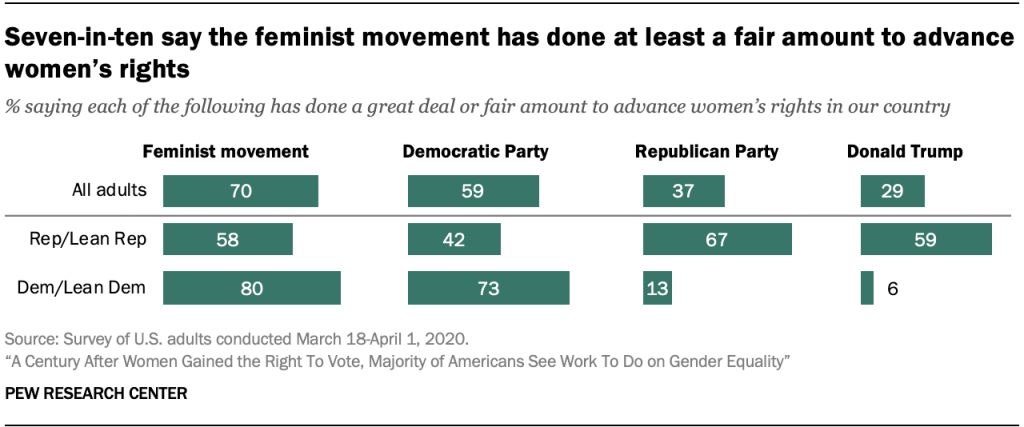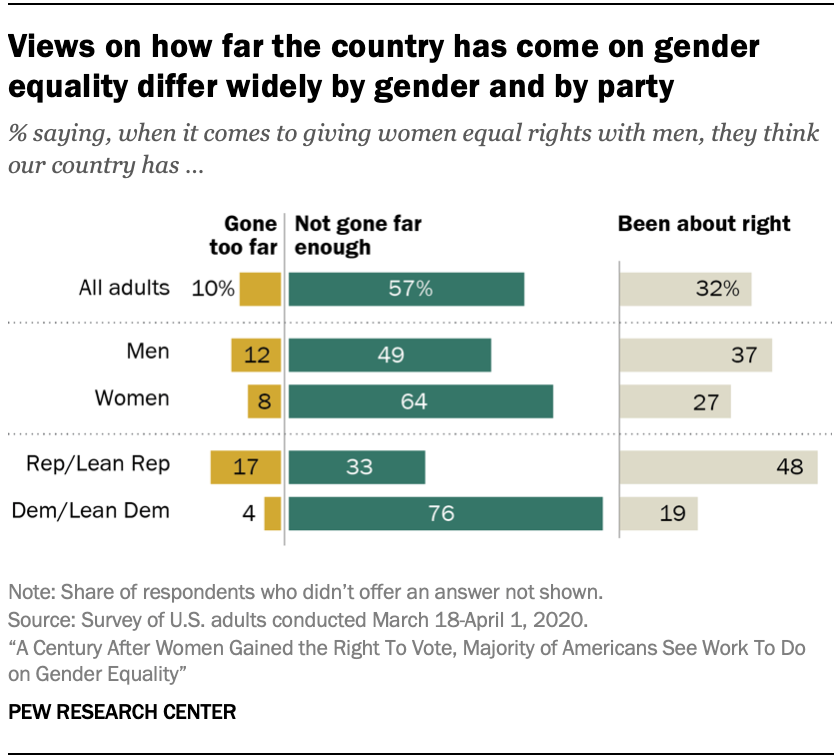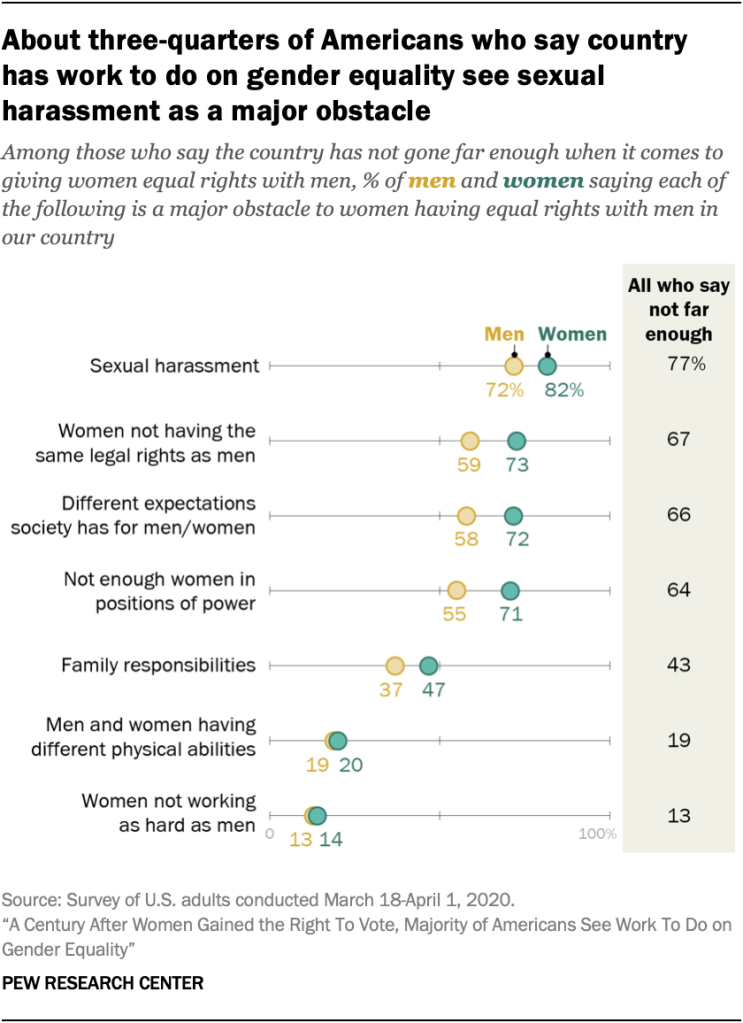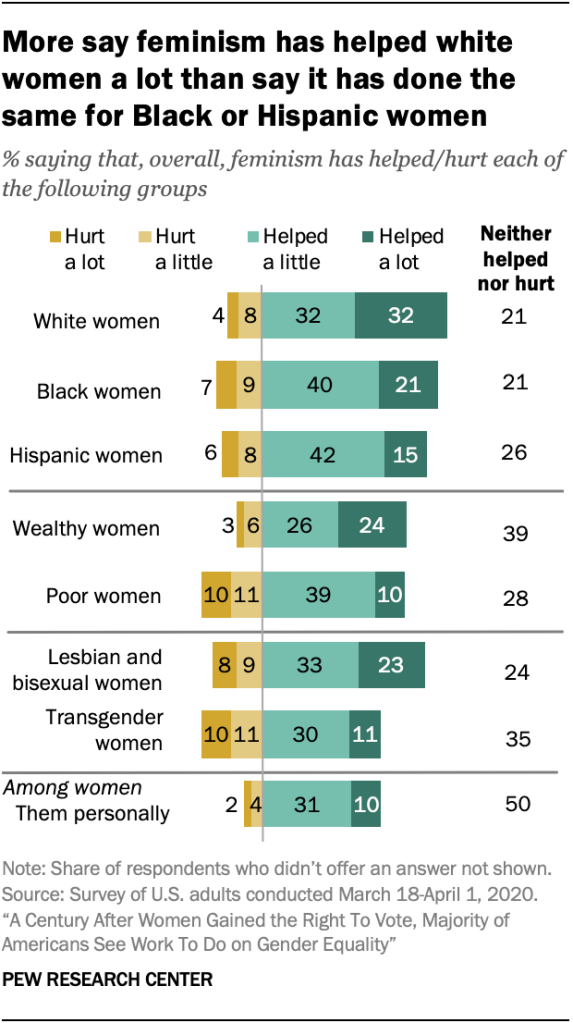Aug. 18 marks the 100-year anniversary of the ratification of the 19th Amendment, which granted women in the United States the right to vote. As this milestone approaches, about half of Americans (49%) say granting women the right to vote has been the most important milestone in advancing the position of women in the country, according to a Pew Research Center study. And while many Americans say the last decade has seen progress in the fight for gender equality, a majority say the country still hasn’t gone far enough in giving women equal rights with men.
Here are some key takeaways from the report, which was based on a nationally representative survey of 3,143 U.S. adults conducted online from March 18-April 1, 2020.
Pew Research Center conducted this study to understand Americans’ views of the current state of gender equality and the advancement of women around the 100th anniversary of women getting the right to vote. For this analysis, we surveyed 3,143 U.S. adults in March and April 2020, including an oversample of Black and Hispanic respondents. The adults surveyed are members of the Ipsos Public Affairs KnowledgePanel, an online survey panel that is recruited through national random sampling of residential addresses and landline and cellphone numbers. KnowledgePanel provides internet access for those who do not have it and, if needed, a device to access the internet when they join the panel. To ensure that the results of this survey reflect a balanced cross section of the nation, the data are weighted to match the U.S. adult population by gender, age, education, race and ethnicity and other categories. The survey was conducted in English and Spanish.
Here are the questions used for this report, along with responses, and its methodology.
A majority (57%) of adults say the U.S. hasn’t gone far enough when it comes to giving women equal rights with men. Assessments of the country’s progress vary by gender and political party. Women (64%) are more likely than men (49%) to say that the country hasn’t made enough progress, and Democrats and those who lean to the Democratic Party are more than twice as likely as Republicans and Republican leaners to say the U.S. hasn’t gone far enough to give women the same rights as men (76% vs. 33%).
Americans are more dissatisfied with the state of gender equality now than when the question was asked in 2017. Three years ago, half of adults said the country hadn’t gone far enough in giving women equal rights with men, compared with 57% of adults today. This attitudinal shift has occurred across both gender and party lines.
Among those who think the country still has work to do in achieving gender equality, 77% say sexual harassment is a major obstacle to women’s equality. Smaller shares, but still majorities, also point to other obstacles: 67% say women don’t have the same legal rights as men; 66% say that there are different societal expectations for men and women; and 64% say there aren’t enough women in positions of power. Women are more likely than men to say these are major obstacles.
When asked what gender equality would look like, many of those who say it’s somewhat or very important for men and women to have equal rights point to the workplace. Specifically, 45% volunteer that a society where women have equal rights with men would include equal pay, and 19% say there would be no discrimination in hiring, promotion or educational opportunities. About one-in-ten (9%) point to more or equal representation in business or political leadership.
About three-in-ten U.S. men think women’s gains have come at the expense of men. Most Americans (76%) say the gains have not come at the expense of men, although 22% of adults – including 28% of men and 17% of women – think they have come at the expense of men. Republican men (38%) are twice as likely as Democratic men (19%) to say the gains women have made have come at the expense of men. A quarter of Republican women also say this, compared with 12% of Democratic women.
Among women, those without a bachelor’s degree are about twice as likely as college graduates to say women’s gains have come at the expense of men (21% vs. 10%). Educational differences are less pronounced among men.
Americans are more than twice as likely to say that, when it comes to gender discrimination, the bigger problem is people not seeing it where it really does exist, rather than people seeing discrimination where it does not exist (67% vs. 31%). Three-quarters of women point to gender discrimination being overlooked as the bigger problem; 60% of men agree.
An overwhelming majority of Democrats (85%) say the bigger problem is people overlooking gender discrimination. Among Republicans, more say the bigger problem is people seeing discrimination where it doesn’t exist (53%) than say it is people not seeing it where it does exist (46%). Republican women are far more likely than Republican men to say people overlooking gender discrimination is the bigger problem (54% vs. 38%).
Majorities say the feminist movement and the Democratic Party have done at least a fair amount when it comes to institutions and groups that have helped advance women’s rights. Seven-in-ten Americans say the feminist movement has done a great deal or a fair amount to advance women’s rights in the U.S., while 59% say the same about the Democratic Party. Far fewer (37%) say the Republican Party has done at least a fair amount to advance women’s rights.

About three-in-ten adults (29%) say President Donald Trump has done at least a fair amount to advance women’s rights, while 69% say Trump has not done much or has done nothing at all.
While a majority of Americans say feminism has had a positive impact on the lives of white, Black and Hispanic women, more say feminism has helped White women a lot. About three-in-ten U.S. adults say feminism has helped the lives of white women (32%), About three-in-ten U.S. adults say feminism has helped the lives a white women a lot, compared with 21% and 15% who say this about Black women and Hispanic women, respectively.
Asked about the impact of feminism on other groups of women, a majority of Americans (57%) say feminism has helped lesbian and bisexual women at least a little, but fewer (41%) say feminism has helped transgender women. And while about half (49%) say feminism has helped wealthy and poor women at least a little, more say it’s helped wealthy women a lot (24%) than say it’s been equally helpful to poor women (10%).
About four-in-ten women (41%) say feminism has helped them personally. Women most likely to say this include those with a bachelor’s degree or more education (55%), Hispanic women (46%), women younger than 50 (47%) and Democratic women (50%).
Most who say the country still has work to do on gender equality say equality is likely to be achieved in the future. More than eight-in-ten Americans who say the country hasn’t made enough progress say it is very likely (31%) or somewhat likely (53%) that women will have equal rights with men in the future, compared with 16% who say they think gender equality is not too likely or not at all likely. Men who say the country has not yet achieved gender equality are more likely than women to say that gender equality is very likely (37% vs. 26%). Democratic women are the least likely to say this is very likely: 23% say this, compared with 35% of Republican women and 38% of Democratic and Republican men.
Note: Here are the questions used for this report, along with responses, and its methodology.



